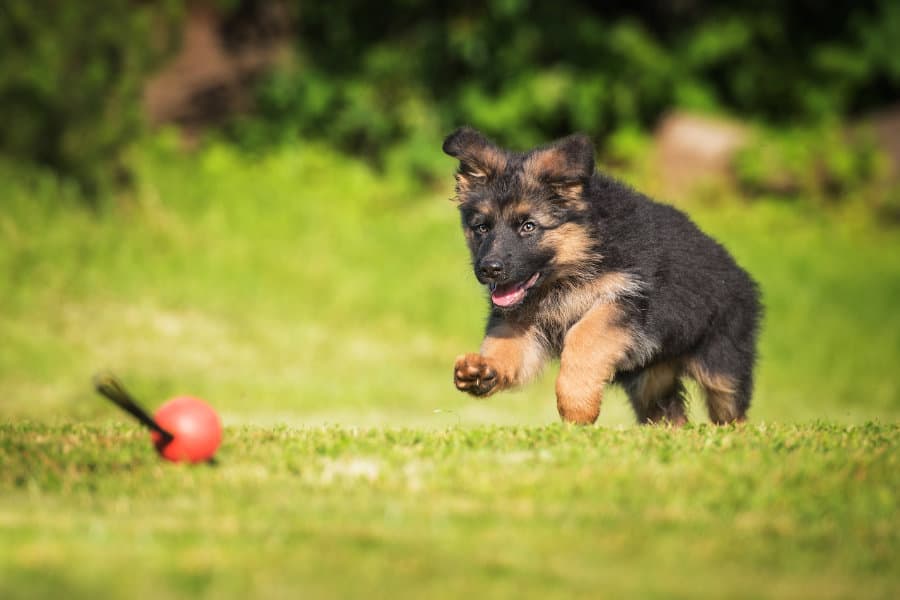If you are the lucky parent of a German Shepherd Dog, you surely need no reminder about the intelligence and agility of this loyal breed. However, you might not always be sure whether your four-legged friend is truly happy. Usually a happy dog is a healthy dog. So, how do you know if your German Shepherd is healthy?
You can tell a lot about a dog’s health by its weight. The ideal weight for a standard German Shepherd male is usually between 60 and 90 pounds, while for a female, it’s between 50 and 70 pounds. Health issues occur due to either inherited conditions or poor care; the latter can lead to devastating and sometimes life-threatening conditions.

We all want the best for our dogs. So, how do we determine whether they are happy and healthy?
How To Determine If Your German Shepherd Is Healthy
I think we can all agree that an unhealthy dog makes for an unhappy owner. There are various questions you can ask yourself in determining whether your German Shepherd is indeed healthy:
- Does your male dog weigh far less than 60 pounds and far more than 90 pounds? Similarly, does your female dog weigh less than 50 pounds and more than 70 pounds?
- Does your dog appear to suffer from pain and lameness?
- Has there been a change in your dog’s appetite or water consumption?
- Does your dog have a bloated abdomen?
- Are its gums red, bleeding, or swollen?
- Is there a discharge from its eyes or nose?
- Do the ears have a bad smell, crusted tips, or redness?
- Is there a discharge from your dog’s anal region with the area being red or swollen?
- Is the skin full of red spots or lumps?
If you’ve answered “yes” to any of the above questions, your four-legged friend is probably not healthy.

What Are The Health Issues Associated With A German Shepherd?
If your German Shepherd suffers from one of the conditions mentioned above, it needs urgent care and treatment as these conditions or illnesses can have devastating consequences:
| Condition | Consequence |
|---|---|
| Overweight or underweight | Obesity can lead to various types of illnesses as well as heart disease. Being underweight will negatively influence your dog’s quality of life and might lead to several health issues later on. |
| Pain and lameness | Your dog might very well suffer from Hip or Elbow Dysplasia, a common heritable condition in German Shepherds Dogs. If not treated, the condition will deteriorate over time, leading to your dog losing function of the affected joints. |
| Bloated abdomen | Bloated abdomen – Gastric Dilatation Volvulus (GDV) present most commonly in deep-chested dogs like the German Shepherd. Bloating cuts off blood flow to the heart, leading to blood not reaching the stomach. Your dog will go into shock and can develop internal bleeding and sepsis. |
| Red or swollen gums | Gingivitis or Stomatitis are bacterial infections that can ultimately lead to your dog losing his teeth. |
| Discharge from eyes | A yellow-green or watery discharge from the eyes can possibly be an indication of Conjunctivitis, which can ultimately lead to blindness. |
| Smelly or crusty ears | Smelly ears might be a sign of either ear infection or ear mites. If left untreated, both these conditions can lead to total deafness. |
| Discharge from the anal region | A discharge from the anal region is due mainly to Anal Sac Disease, which involves the anal sacs becoming clogged. If left untreated, this disease can lead to the anal sacs becoming cancerous. |
| Skin condition | There are various types of skin conditions. Lumps, spots, or sores can be due to either simple allergies or life-threatening illnesses. |
Don’t be alarmed by all these health issues, as there are various steps you can take to ensure your German Shepherd is happy and healthy once again.

How Do I Keep My German Shepherd Healthy?
To avoid having to run to the vet for fear of your German Shepherd having a life-threatening condition or illness, there are various things you can do at home to ensure that you keep your four-legged friend healthy.
- Maintaining good health and weight: Your German Shepherd needs an excellent nutritional diet because of its size. Be sure to feed him top-quality dog food that contains a good balance of protein, fiber, and carbs.
- Hip dysplasia: Hip dysplasia is mainly heritable, so if you are looking to buy a puppy, ask the breeder to prove that the litter has been screened. If your older dog develops hip dysplasia, there isn’t much you can do but exercise him regularly and feed him a good nutritional diet.
- Avoid GDV: To avoid a bloated abdomen, slow down your dog’s feeding. There are great feeding alternatives on the market; one such alternative is the feeding ball, which combines playtime with feeding time. Another strategy is not to elevate his feeding bowl. Finally, give your dog small meals throughout the day.
- Avoid Gum Disease: Brush your dog’s teeth daily, and take him for regular oral cleanings and examinations.
- Avoid Anal Sac Disease: Ensure that your dog’s food contains adequate amounts of fiber. Veggie snacks like carrot sticks and grated apples are excellent sources of fiber and vitamins. It might also be a good idea to include fish oil in his diet.
- Manage skin conditions: Sometimes, nutritional supplements and fatty acids make all the difference. Bison, for instance, is high in fat and protein and makes for a great supplement that you can occasionally feed your dog.
Last, be sure that you give your German Shepherd regular physical exercise, fun-time mental activity, and regular visits to the vet.
Final Thoughts
Ultimately, there are only two ways in which to show your German Shepherd your genuine appreciation for his companionship: regularly check on his health and constantly shower him with love. Because a healthy dog is a happy dog.
